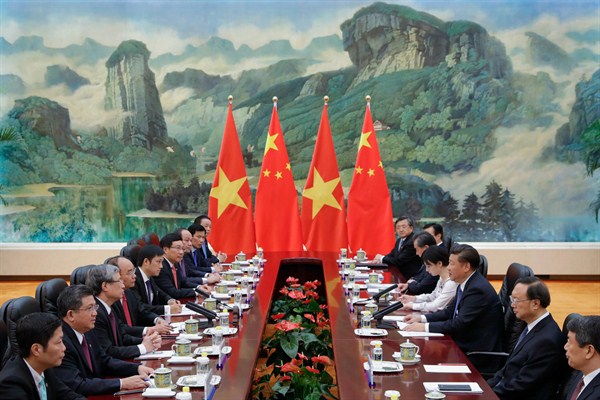Vietnam’s prime minister, Nguyen Xuan Phuc, concluded a six-day state visit to China last week that included meetings with President Xi Jinping, Premier Li Keqiang and top legislator Zhang Dejiang. Phuc also attended the China-ASEAN Expo and China-ASEAN Business and Investment Summit in Nanning and made a business-focused visit to Hong Kong. But the trip’s primary focus was deepening economic and people-to-people ties, which have been strained in recent years by spillover from China and Vietnam’s disputes in the South China Sea.
During Phuc’s meetings in Beijing, he and his Chinese counterparts seemed eager to de-emphasize those South China Sea tensions in order to pursue other areas of cooperation. According to the state-owned Xinhua news service, Xi assured Phuc that “China and Vietnam can manage their differences and promote maritime cooperation through friendly negotiations,” while Li said the two countries should “maintain maritime stability, manage and control disputes . . . and create conditions for the stable development of bilateral ties.” But despite the flowery words, the trip didn’t mark any real departure from Hanoi’s recent South China Sea policy.
China’s geopolitical weight and its importance to the Vietnamese economy mean that leaders in Hanoi understandably feel compelled to seek positive relations with their northern neighbor where possible. But those relations do not come at the expense of Vietnam’s territorial and maritime claims in the South China Sea, to which Vietnamese leaders and the public remain staunchly committed. Instead, a pattern has emerged over the past five or six years in which bilateral relations suffer at regular intervals due to incidents in the South China Sea. These flashpoints include the violent treatment of Vietnamese fishermen during Beijing’s annual unilateral fishing ban, diplomatic outcries from Hanoi over Chinese construction or other activities in the Spratly Islands, or most spectacularly, the deployment of a Chinese deep-water oil-drilling rig in contested waters.

